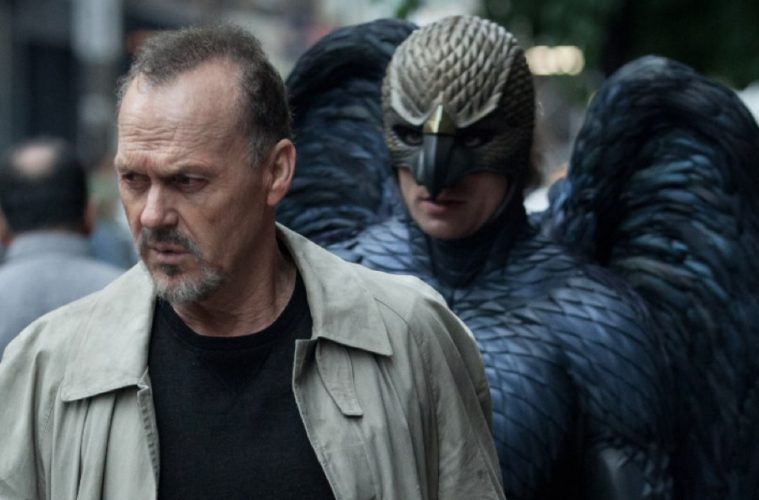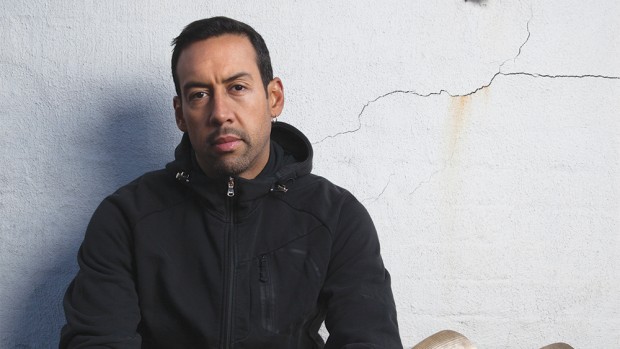
Thanksgiving is just a few days away, but before we dig into the seasonal fowl, let’s digest this year’s other most buzz-worthy winged creature. Alejandro Gonzalez Iñárritu‘s one-of-a-kind film Birdman: Or (The Unexpected Virtue of Ignorance) hit theaters in October and thanks to a healthy expansion, it’s very much still in the conversation. Picking up speed on a weekly basis, it’s a tour de force in acting, direction, and cinematography, all seamed together with one very jazzy soundtrack.
Antonio Sanchez, a four-time Grammy Award winner, embarked on his first role as a film composer with the project, recording parts of Birdman‘s drum score by improvising from the script’s themes. We recently got to speak with Sanchez about his background and experiences on the film. Check out the full conversation below along with his full score and listen to our discussion on the film here.
The Film Stage: I tend to avoid asking basic questions like, “How did you get involved?” but this is such a unique project and Alejandro is such a unique director that’s probably the best way to start. So how and when were you approached, and what made you want to take this project?
Antonio Sanchez: I immediately wanted to take this project because Alejandro is an idol of mine. He’s such a creative force and a true example of what it means to be an artist. He was already trying something so different from his previous movies which was interesting enough, but he asked me out of the blue, and the fact he wanted nothing but a drum score was such a wild idea that I just had to say yes.
It was a scary proposition because I had no point of reference of how to achieve this. There’s no other movie I know that has a score like this. So there were a lot of factors that were unique and interesting, and again it was scary, but very exciting. We’ve known each other of a while, and he’s always been a big fan of Pat Metheny. I’ve been playing with Pat’s band for the last 14 years and Alejandro and I met after a concert at the Universal amphitheater in L.A. We started talking and hit it off, and we’ve kept in touch all these years.
The other connection we had is that he was a DJ at my favorite radio station in Mexico City. Growing up, I used to listen to him and Martin Hernandez, the guy who does sound design for Alejandro’s movies, all the time. To make things even more interesting and more full circle, the first time I heard Pat Metheny was on their radio show.
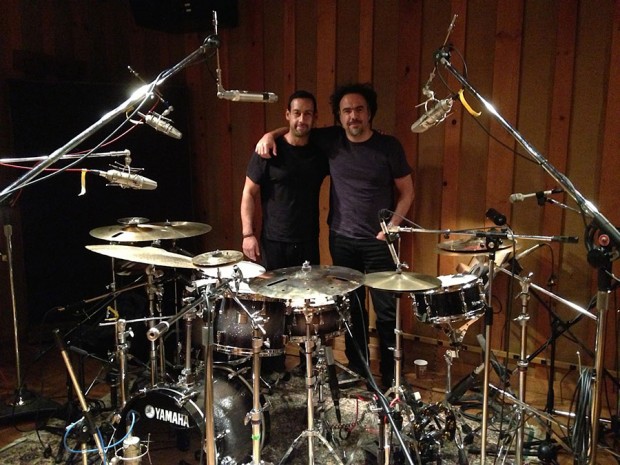 Seeing all those coincidences come together must be pretty cool from your end? What’s it like working with your hero-turned-friend then?
Seeing all those coincidences come together must be pretty cool from your end? What’s it like working with your hero-turned-friend then?
I went to see Birdman yesterday with some guys from the band. It was their first time, my third, and I still just marvel at the risk he, and everyone involved, took with the film. They shot it in a month, and the whole nature of the project is so ambitious I am so glad to see how it all came together. I really hope this gets the recognition it deserves.
The more time goes by, the more fans Birdman is going to pick up. I’m a life-long Michael Keaton fan, so that was the allure for me, but there’s so much about this picture that just shines. The direction, the writing, the technical tricks, and, of course, your jazzy drums, are all amazing. This is, hands down, the one to beat this year.
[Laughs] Yeah, I think so too! But like I was saying before, Alejandro is such a creative force, and like a true artist, he’s always trying to reinvent himself. The goal should always be for any artist to challenge their talents and push in new directions. The way Alejandro does that is exceptional.
Alejandro is a visionary, and you’ve said that it was his idea for a solo drum score. What kind of ideas did you throw back to him?
The first thing he did was send me the script and honestly it was the first time I’d ever done that, which is read something without the movie being shot. Movie scripts are weird – they’re not like a book that has a lot of subtext and detail, it’s just a flat outline of the story. All that detail and subtext comes from the shoot with what the actors and cinematographers bring to the picture. It would be like if I sent Alejandro a demo CD, and then later gave him extensive sheet music afterwards.
I thought the script was cool, but it didn’t give me many ideas and didn’t know what to do with it. So I thought maybe I’d start by composing rhythmic themes for the characters and give Alejandro a range – funny, relaxed, ambient, pensive, etc. – and see what he says. I did that and he said “No, that’s the opposite of what I’m looking for. I want something really jazzy and spontaneous. When you see what we’re putting together, then you’ll get it.”
A few weeks later they started shooting and I went to the set. That’s when I started getting inspired, when I saw Michael on the street and other actors taking direction from Alejandro. As a jazz musician I am very used to improvising and doing things spur of the moment and composing on the spot. So that wasn’t a problem, I was just waiting for some guidance from Alejandro.
We both went to a studio in NY and we created some demos together. He would explain the scenes to me, and having read the script I knew where he was coming from, but he would also give me the back story of each scene. I told him to sit right in front of my drums and think about the script. I would start playing and asked him to raise his hand whenever he saw the scene going to the next sequence. Alejandro would visualize Riggan (Michael Keaton) sitting at his dressing table, then get up, walk out of the room and down the hall. So I would start playing and when Riggan or any other character would do something new, I would change my playing style, speed, texture or add an accent.
I was completely improvising, there was nothing for me to look at but Alejandro’s hand. It felt like a continuous groove but it was all playing to things in his mind. [Laughs] And it’s kind of tough to follow someone’s mind and imagine it as well. [Laughs]
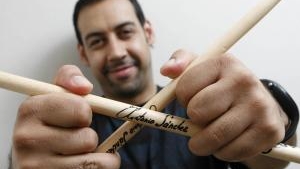 They went on to finish shooting the film, and later I went to L.A. and saw what they did. It was a rough cut, and they had spliced my demos and put them into different scenes. It was pretty crude, but Alejandro saw that it was working and he liked it. He sent me an email that said he got the green light and we were going to continue doing this. So I went back to the studio and we were going to do it all over again but now to picture. But Alejandro had really taken to some of the demos and blanket of sound I created, so it was a matter of recreating it in a more honed in way with all the images. But this time he could be more specific to scenes and gestures. We also made the drums sound a little more raggedy and beaten up, not as clean as the first time around.
They went on to finish shooting the film, and later I went to L.A. and saw what they did. It was a rough cut, and they had spliced my demos and put them into different scenes. It was pretty crude, but Alejandro saw that it was working and he liked it. He sent me an email that said he got the green light and we were going to continue doing this. So I went back to the studio and we were going to do it all over again but now to picture. But Alejandro had really taken to some of the demos and blanket of sound I created, so it was a matter of recreating it in a more honed in way with all the images. But this time he could be more specific to scenes and gestures. We also made the drums sound a little more raggedy and beaten up, not as clean as the first time around.
I was noticing that some of the tracks on the soundtrack have no beginning or end. In the film it all feels continuous but the CD feels unfairly chopped up. How did you extract those tracks from the overall film? Also, can you tell us how you achieved the cool channel effects on tracks like “Doors and Distance” and the ambient and ethereal accents in “Fire Trial”? You’re on the drums, but when do you get help from digital artists?
“Doors and Distance,” that plays when Michael Keaton and Edward Norton go out of the theater and into the street on their way to the bar. That track was made for when you see the drummer they walk past for two seconds. What Alejandro wanted was for it to feel like the drums were, at first, inside and part of the score. So the music starts when Michael is in the dressing room and as he walks toward the door, the sound becomes focused. As soon as he opens the door, it sounds like they are on the street. The music passes from being part of the score to being an actual part of the scene, like source music, but it feels dynamic and real, especially when you get to see the drummer.
The way we did that was just take my drums out in the street. There were a couple of guys with mics and really long cables and they were about a block away. I started playing and they started moving really slowly toward the drums. Then they would pass in front of me, stand there for a couple seconds and then walk away from me in another direction for another block. So what you hear is actually the mics getting closer and further away from me.
That is awesome! I listened to the score plenty of times in my car, and I could hear the sound move around. I thought that was just a studio tweak, like fading the music on different channels. And in the actual film I thought, like another scene later on, it was a trick to help hide the cuts in the film.
Of course they could have achieved it in the studio in post-production, but the only effect was they they used a real mic in a physical setting. I thought that was really cool.
There are two scenes where we do see a drummer. We know that’s not you. But when was the idea introduced that there would be an actual musician you’d have to deal with on screen? Was that his music or yours?
Alejandro had that idea in mind from the beginning. But because I wasn’t around when they were shooting, I recommended a really good friend Nate Smith. But they shot that before we did the final sessions. Instead of him having to match the demos I created, it was the other way around. Nate was just improvising and so when I got the video of him playing, I had to change my music to match what I saw him play. I had to learn it and for those two seconds I had to match him exactly. That took a while. I’m very glad Alejandro is that nit-icky because it makes everything better in the long run. He would look at some takes I had done and tell me, “No, you can tell that it’s not completely precise.” So I took time to learn the sticking that Nate was using.
This is your first credit scoring a film. Does this seem like something you’d like to pursue? Or are you more interested to continue touring and playing live shows?
It’s hard to tell. I have this totally other life as a jazz musician. I’m a composer, yes, and next year I am coming out with my fourth and fifth solo record. I’m also recording a one-hour suite with my band and I’m also very busy touring – this year it was with Pat Metheny and next year it will be with my band. So if it happens that I score another film, I will welcome it; it’s not something I’m opposed to at all. But film music is not something that I have looked for. It kind of found me and Alejandro really made this a special project to be part of. He’s improvisational so in a way it was very much like jazz. I would love to do more but it’s not like I have been trying to get into this business for 20 years and now I finally got my shot.
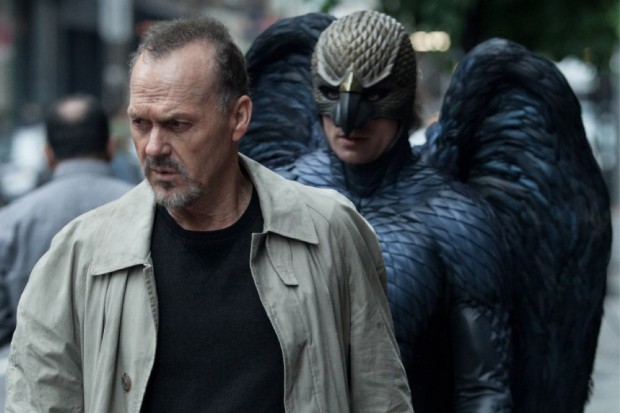
There many different kinds of jazz and there seems to be a mix of styles in the film. The story takes place in New York City, so was the music and your hybrid approach based on the setting and the diversity of the city in any way?
I didn’t start off as a jazz musician. I began playing as a rock drummer and transitioned into fusion and Latin jazz, and everything from Brazilian to Caribbean music. I play with many bands who have different jazz angles, so the sound in the film comes from me actually. I have a large vocabulary available to me when I improvise, so when you hear the score and you hear the music in the beginning versus what goes on in the end credits, which is just me going completely nuts on the drums, you can hear a lot of different currents.
I do a lot of second line stuff from New Orleans and I do some funk stuff, then I do some free stuff and some straight-ahead swing stuff, so I was trying to work with what Alejandro was giving me, and, in turn, I tried to give him something that would make sense. But like I said, I am able to handle many different kinds of jazz. I wasn’t over-thinking any of it, I was just reacting to it. That’s what Alejandro wanted and I think that’s why it worked.
Birdman, aside from its technical merits and superb acting, has a lot of people talking about the ending. Like Inception, they are forming their own opinions about what happens before the credits roll. Unless Alejandro told you what he was going for, what are your thoughts on the final scene? What do you think it meant?
I like to not over-think it. The best thing about it is that you just don’t know what happened and that allows you to believe whatever you want. But I like that it’s all up to you. Personally I wouldn’t like it if someone told me exactly what happened. It’s fantastic and I like that it can be a few possibilities, all are likely and yet none are definitive.
Nice answer, and I have to agree, I’d rather not know than have anything confirmed. Well, every element – shot, performance, effect, etc. – in the film is just jaw-dropping. On top of all that, there’s one rooftop transition, which travels backwards mind you, to the fire escape across the street that just floored me. What did you find the most thrilling after seeing this three times?
I have to say it’s that whole sequence after Riggan talks to Tabitha the critic. You know, where he’s drunk then goes to the liquor store and gets more drunk. Then he falls asleep, it transitions to daytime and then out of no where this huge action scene takes place.
I like that you would never expect that in the movie, but when it happens, it’s full on – like one of the best action movies ever made and it lasts maybe ten seconds. So the fact the fact that they held it back for so long but then put it all out there is really cool.
Birdman is now in theaters.

